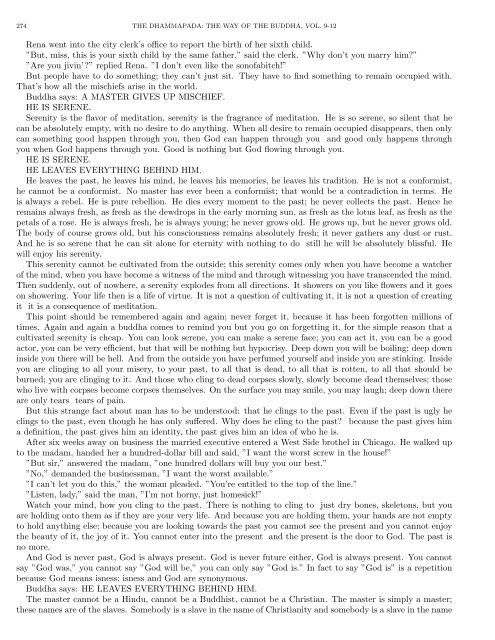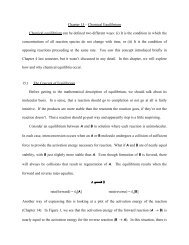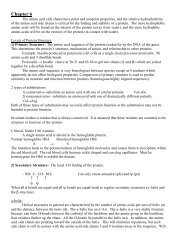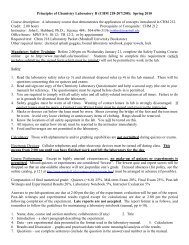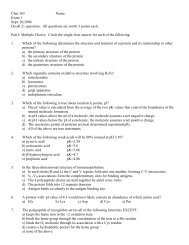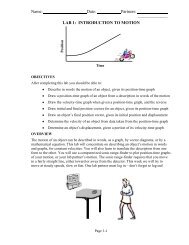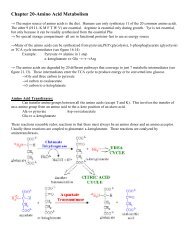THE DHAMMAPADA: THE WAY OF THE BUDDHA, VOL. 9-12 The ...
THE DHAMMAPADA: THE WAY OF THE BUDDHA, VOL. 9-12 The ...
THE DHAMMAPADA: THE WAY OF THE BUDDHA, VOL. 9-12 The ...
Create successful ePaper yourself
Turn your PDF publications into a flip-book with our unique Google optimized e-Paper software.
274 <strong>THE</strong> <strong>DHAMMAPADA</strong>: <strong>THE</strong> <strong>WAY</strong> <strong>OF</strong> <strong>THE</strong> <strong>BUDDHA</strong>, <strong>VOL</strong>. 9-<strong>12</strong><br />
Rena went into the city clerk’s office to report the birth of her sixth child.<br />
”But, miss, this is your sixth child by the same father,” said the clerk. ”Why don’t you marry him?”<br />
”Are you jivin’?” replied Rena. ”I don’t even like the sonofabitch!”<br />
But people have to do something; they can’t just sit. <strong>The</strong>y have to find something to remain occupied with.<br />
That’s how all the mischiefs arise in the world.<br />
Buddha says: A MASTER GIVES UP MISCHIEF.<br />
HE IS SERENE.<br />
Serenity is the flavor of meditation, serenity is the fragrance of meditation. He is so serene, so silent that he<br />
can be absolutely empty, with no desire to do anything. When all desire to remain occupied disappears, then only<br />
can something good happen through you, then God can happen through you and good only happens through<br />
you when God happens through you. Good is nothing but God flowing through you.<br />
HE IS SERENE.<br />
HE LEAVES EVERYTHING BEHIND HIM.<br />
He leaves the past, he leaves his mind, he leaves his memories, he leaves his tradition. He is not a conformist,<br />
he cannot be a conformist. No master has ever been a conformist; that would be a contradiction in terms. He<br />
is always a rebel. He is pure rebellion. He dies every moment to the past; he never collects the past. Hence he<br />
remains always fresh, as fresh as the dewdrops in the early morning sun, as fresh as the lotus leaf, as fresh as the<br />
petals of a rose. He is always fresh, he is always young; he never grows old. He grows up, but he never grows old.<br />
<strong>The</strong> body of course grows old, but his consciousness remains absolutely fresh; it never gathers any dust or rust.<br />
And he is so serene that he can sit alone for eternity with nothing to do still he will be absolutely blissful. He<br />
will enjoy his serenity.<br />
This serenity cannot be cultivated from the outside; this serenity comes only when you have become a watcher<br />
of the mind, when you have become a witness of the mind and through witnessing you have transcended the mind.<br />
<strong>The</strong>n suddenly, out of nowhere, a serenity explodes from all directions. It showers on you like flowers and it goes<br />
on showering. Your life then is a life of virtue. It is not a question of cultivating it, it is not a question of creating<br />
it it is a consequence of meditation.<br />
This point should be remembered again and again; never forget it, because it has been forgotten millions of<br />
times. Again and again a buddha comes to remind you but you go on forgetting it, for the simple reason that a<br />
cultivated serenity is cheap. You can look serene, you can make a serene face; you can act it, you can be a good<br />
actor, you can be very efficient, but that will be nothing but hypocrisy. Deep down you will be boiling; deep down<br />
inside you there will be hell. And from the outside you have perfumed yourself and inside you are stinking. Inside<br />
you are clinging to all your misery, to your past, to all that is dead, to all that is rotten, to all that should be<br />
burned; you are clinging to it. And those who cling to dead corpses slowly, slowly become dead themselves; those<br />
who live with corpses become corpses themselves. On the surface you may smile, you may laugh; deep down there<br />
are only tears tears of pain.<br />
But this strange fact about man has to be understood: that he clings to the past. Even if the past is ugly he<br />
clings to the past, even though he has only suffered. Why does he cling to the past? because the past gives him<br />
a definition, the past gives him an identity, the past gives him an idea of who he is.<br />
After six weeks away on business the married executive entered a West Side brothel in Chicago. He walked up<br />
to the madam, handed her a hundred-dollar bill and said, ”I want the worst screw in the house!”<br />
”But sir,” answered the madam, ”one hundred dollars will buy you our best.”<br />
”No,” demanded the businessman, ”I want the worst available.”<br />
”I can’t let you do this,” the woman pleaded. ”You’re entitled to the top of the line.”<br />
”Listen, lady,” said the man, ”I’m not horny, just homesick!”<br />
Watch your mind, how you cling to the past. <strong>The</strong>re is nothing to cling to just dry bones, skeletons, but you<br />
are holding onto them as if they are your very life. And because you are holding them, your hands are not empty<br />
to hold anything else; because you are looking towards the past you cannot see the present and you cannot enjoy<br />
the beauty of it, the joy of it. You cannot enter into the present and the present is the door to God. <strong>The</strong> past is<br />
no more.<br />
And God is never past, God is always present. God is never future either, God is always present. You cannot<br />
say ”God was,” you cannot say ”God will be,” you can only say ”God is.” In fact to say ”God is” is a repetition<br />
because God means isness; isness and God are synonymous.<br />
Buddha says: HE LEAVES EVERYTHING BEHIND HIM.<br />
<strong>The</strong> master cannot be a Hindu, cannot be a Buddhist, cannot be a Christian. <strong>The</strong> master is simply a master;<br />
these names are of the slaves. Somebody is a slave in the name of Christianity and somebody is a slave in the name


